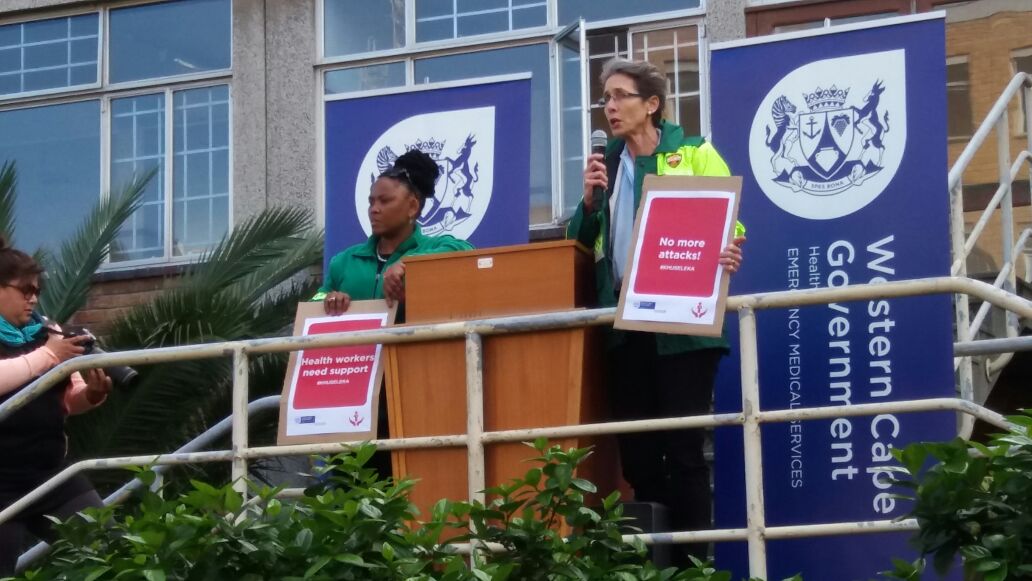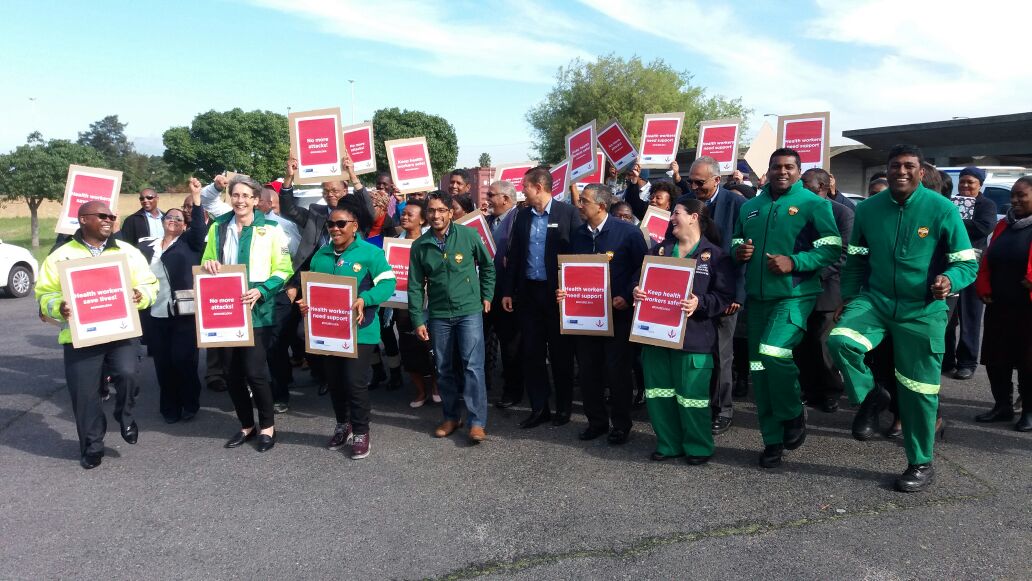
News
Enhanced Safety measures for Health Staff
Today (15 August 2016), the Western Cape Health Department launched Operation Khuseleka, a staff safety initiative.
Operation Khuseleka (to protect) aims to encourage co-operation within broader society to help keep health workers safe. No individual or group can guarantee the safety of health workers, but a whole-of-society approach can make a difference.
Representatives of various stakeholder groups held a symbolic walk today to show solidarity for staff safety. Participants included health workers, community members, hospital management, Emergency Medical Services (EMS) staff, officials, professional bodies and education partners.
Health MEC, Dr Nomafrench Mbombo, said: “Everyone – individuals, Government, professional bodies, organized labour, political and civic leaders, the media and communities – has a role to play to protect our health services. Increasingly, we see alarm being raised by health workers themselves about violence or ill treatment.”
“It is time for the whole society to realize that the safety of communities is inextricably linked to the safety of health workers. Whether it is attacks against EMS workers, who often work at unsafe hours, or whether it involves some other ill treatment, we must unite to protect our health services, ” continued the Minister.
“We are very aware of the personal and safety risks to our staff and thus we wish to show our solidarity with them today; we are committed to safe hours and to make their environment as safe as possible,” says Dr Beth Engelbrecht, Head of Department. “Staff safety has recently emerged in the internal Staff Satisfaction Survey as the number one concern for health staff. The Department is paying close attention to this issue.”
The Department has in the past found that attacks on EMS staff were more likely to be linked to gang activity, whereas updated stats show an increase in the number of robberies and assault with a weapon.
The Department views criminal attacks on our staff as an extremely serious matter, and a number of measures have been implemented in response.
Extensive engagements are ongoing with the South African Police Service, Community Police Forums, the Department of Community Safety and various other safety organisations.
These partners supply our teams with real-time information and intelligence about the situation on the ground in all areas. This arrangement remains in place and EMS teams have the option to call for assistance, or may opt to wait for a situation to be normalised prior to entering an unsafe area.
In cases where the situation in an area is deemed too unsafe for our staff, patients are informed that the response will be delayed due to safety concerns. The impact on our EMS response times, however, may cause life-saving services to be delayed – which is why we require maximum support from communities, police, and other community safety groupings.
Improved safety technology on our ambulances includes consoles which contain tracking devices and other security features. The addition of this technology has assisted in crews being quickly assisted in emergency situations. There have also been 10 successful arrests made this year, due to the technology and help from the community.
The Department also runs an extensive internal programme of support to its health workers. This includes counselling services, support for medical injuries, active 24/7 management support and increased internal communication to keep staff informed.
A number of further engagements recently have resulted in the Department broadening its response, and expanding its community engagement efforts.
The Community Safety Department is assisting Western Cape Government Health to broaden its links with community policing forums and local safety forums.
The aim is to increase the number of pro-active engagements in communities to try and spread the message that health workers must be respected. The main message will be that health workers are servants of the people, who need to have the space and protection to perform their duties.
To further spread this message, the Department is embarking on a sustained community engagement campaign, characterised by regular community media messages to spread awareness. This community campaign will also involve community walk-abouts, where EMS Management and officials will join with community members to spread the message on the ground.
Mr Phumzile Papu, Manager of Emergency Medical Services, appeals to communities: “We urge people to remember that we are there to help. It could be your mother, sister, son or brother in the ambulance. Let us do our work safely. Please don’t let thugs rob communities of an essential service”.
Barbara Ruiters Vice-Chair of Western Cape Chamber says: “(The subject of) internal and external safety of health workers is a broad issue and has been a concern and point of contention for a long time. The unions agree and appreciate the process of discussion the employer has embarked upon, which included all the unions represented in the Chamber as a key stakeholder.”
The unions representative of workers in the WC Chambers are: NUPSAW, PSA, HOSPERSA, NEHAWU, and DENOSA.
Another major safety concern is the issue of safe work hours for doctors. To date, the Western Cape has been following HPCSA guidelines on working hours for young doctors. Rather than wait for national guidelines to be amended, the province has decided to shorten the length of shifts for its staff – a move that has been supported by associations representing medical staff.
Health MEC, Dr Mbombo made the following major announcement this morning: “We can confirm that we have heard and adhered to the plea of young doctors about their working hours. Together we have come up with a solution, which is now being implemented. As a result, working hours will no longer exceed a 24-hours shift. This arrangement is set for implementation by 1 January in all State hospitals in the Western Cape and is in line with the requests received from various organisations, including the South African Medical Association (SAMA) and the Junior Doctors Association of South Africa (JUDASA).”
“The solution was also reached through consultation with our Higher Education partners. It is a great improvement on the current 30 hours shifts that are stipulated in the national guideline set by the Health Professions Council. This shows the commitment of the Department provincially towards improving conditions of staff in the Western Cape”, Mbombo added.
Luyanda Mfeka
Spokesperson to the Western Cape Minister of Health, Dr Nomafrench Mbombo
Mobile: 076 171 5978
Tel: 021 483 5862
Email: luyanda.mfeka@westerncape.gov.za
OR
Robert Daniels
Communications Officer: Emergency Medical Services and Forensic Pathology Services
Western Cape Government Health
Tel: 021 937 0608
Mobile: 073 008 2842
Email: robert.daniels@westerncape.gov.za





